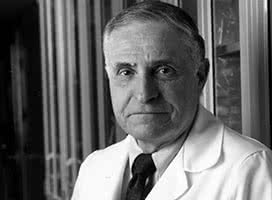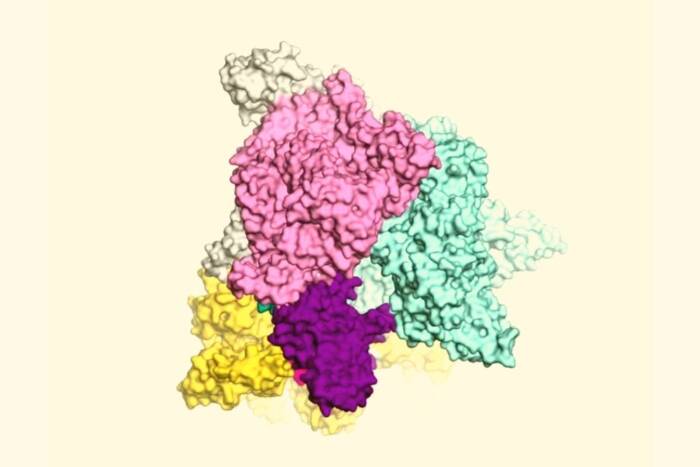Obesity researcher and former hospital physician-in-chief Jules Hirsch dies
Jules Hirsch, an early leader in the study of human metabolism, died at age 88 in Englewood, New Jersey, after a long illness. His research, conducted at The Rockefeller University, helped establish the biological underpinnings of obesity, challenging the notion that the disease results from a lack of will power.

Jules Hirsch
“Jules Hirsch was a brilliant clinical investigator whose meticulous studies led to his landmark discovery that the body responds to weight loss by reducing energy expenditure, providing a crucial new insight into why obese individuals have so much difficulty losing weight and sustaining the weight loss,” says Barry Coller, vice president for medical affairs and the current physician-in-chief of The Rockefeller University Hospital.
Hirsch joined Rockefeller’s faculty in 1954 and remained there for the rest of his career. In the late 1950s, when he became interested in studying obesity, most scientists considered fat, or adipose tissue, to be biologically inert—a passive insulator in which the body stores energy in the form of triglycerides. Over the next decades, Hirsch’s research helped to alter this view by highlighting the dynamic interactions among diet, metabolism, and obesity.
Early in his career at Rockefeller, Hirsch worked with Edward H. Ahrens, Jr., to pioneer techniques for separating and studying fats in blood and adipose tissue, as well as new methods for more easily obtaining patient research samples. These advances allowed Hirsch and colleagues to study how people’s diets affect their blood concentration of different types of fats—observations that contributed to a growing understanding of the relationship between diet and heart disease.
Hirsch was physician-in-chief of the hospital from 1992 to 1996. During that time, in 1995, he published what was perhaps his most widely known study, which offered an explanation for why people who lose weight tend to regain it over time. The study was quickly cited as a classic in the field for its exploration of the regulation of human body weight.
The work was based on more than ten years of clinical research at the Rockefeller University Hospital. Hirsch and his colleagues Rudolph Leibel and Michael Rosenbaum gave patients precisely defined formula diets to make them gain or lose ten percent of their body mass, and carefully monitored their food intake, energy expenditure, and weight changes. The study involved 18 obese men and women and 23 people who had never been obese.
They found that both groups reduced their energy expenditure when their weight was lower than normal, slowing their metabolism, and leading to both physiological and psychological signs of semi-starvation. In addition, people in both groups burned calories faster when their weight was higher than normal. The results explained the difficulty many people have in maintaining weight loss, since the changed metabolism requires a permanent reduction in caloric intake to maintain the lower weight.
In 1987, when Olga Ford, a nursing assistant at the hospital, began working with Hirsch on this study, his concern for study volunteers impressed her. “When he interacted with the patients, he was genuinely concerned with their lives as a whole,” Ford says. “In addition to the many physical complications that can accompany obesity, the condition affects someone emotionally, and he made a point of talking with the patients about how their weight affected that aspect of their lives.”
Hirsch had a smile and greeting for everyone he worked with at the hospital, no matter when or where he encountered them, Ford says.
Born in New York City in 1927, Hirsch received his undergraduate education at Rutgers University and earned his M.D. at Southwestern Medical School, University of Texas–Dallas in 1948. After an internship at Duke University Hospital, a residency at Upstate Medical Center in Syracuse, New York, and two years as an officer in the Public Health Service, Hirsch joined Rockefeller University (then The Rockefeller Institute) as an assistant physician. By 1967, he was a professor and senior physician, and he was named Sherman M. Fairchild Professor in 1988.
In addition to serving as physician-in-chief, he was chairman of the hospital’s institutional review board from 1984 to 1996. He was president of the Association for Patient-Oriented Research and the American Society for Clinical Nutrition, and contributed as an editor or editorial board member to more than a dozen journals. Among many honors and awards, Hirsch was elected to the Institute of Medicine, and he received the Stunkard Lifetime Achievement Award from The Obesity Society in 2006.
“A leading figure in the field of obesity research, Hirsch made many far-reaching and critical contributions that have advanced the study of human metabolic health,” says Marc Tessier-Lavigne, the university’s president. “His research laid an important foundation for the current understanding of this stigmatized disorder for addressing the ongoing obesity crisis.”
Hirsch was predeceased by his wife, Helen Davidoff Hirsch, a distinguished psychoanalyst, as well as by his siblings, Mildred, Chester, and Ann. He is survived by his two sons, David and Joshua, and by his nieces and nephews, Shirley Kaplan, Linda Sinins, Joseph Hirsch, Susan Berger, Norman Silber, and Michael Silber. He died on July 23.


